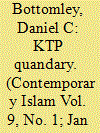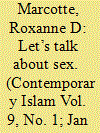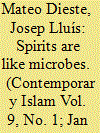|
|
|
Sort Order |
|
|
|
Items / Page
|
|
|
|
|
|
|
| Srl | Item |
| 1 |
ID:
137511


|
|
|
|
|
| Summary/Abstract |
The developing field of Islamic chaplaincy consists of an emergent group of religious authorities in the American Muslim community engaging in a dynamic, sometimes ambiguous, professional field. We demonstrate how prison chaplains provide religious accommodation, advocacy for civil rights, and potentially rehabilitative services to incarcerated Muslims; Muslim hospital chaplains provide service to hospitalized patients regardless of faith tradition, though the lack of adequately Clinical Pastoral Education (CPE)-trained Muslims inhibits expansion; Muslim military chaplains struggle with suspicion from homeland security agencies, while their endorsing bodies are inadequately developed for training and support; and Muslim college chaplains nurture students in a variety of settings, though often without adequate funding models. This research brings disparate streams of scholarship together to provide a benchmark for the future development of Islamic chaplaincy in the USA.
|
|
|
|
|
|
|
|
|
|
|
|
|
|
|
|
| 2 |
ID:
137510


|
|
|
|
|
| Summary/Abstract |
The history of Islam and Indonesian nationalism has been one of constant contestation and acquiescence. Although a new openness in discussing Islamic issues has emerged within Indonesia since President Suharto’s rule came to an end, past logics of national cohesion have not dissipated and have in fact contributed to the upheaval over the Ahmadiyya’s position as Indonesian Muslims and Indonesians. Exploring Indonesian Identification Cards (Kartu Tanda Penduduk, otherwise known as KTP), which currently require every applying Indonesian citizen to self-identify with one of six religious options: (1) Islam; (2) Christianity; (3) Catholicism; (4) Hinduism; (5) Buddhism; and (6) Confucianism, I argue that despite the 2008 Indonesian Joint-Ministerial Decree categorizing the Ahmadis as deviant Muslims, KTP offers the group an opportunity to publically declare and receive official recognition of their Muslim identity from the Indonesian government. Thus, a situation has emerged in which contradictory governmental action problematizes religious categories and illuminates the paradoxical nature of Indonesian nationalism.
|
|
|
|
|
|
|
|
|
|
|
|
|
|
|
|
| 3 |
ID:
137513


|
|
|
|
|
| Summary/Abstract |
Sex talk is ubiquitous, yet often remains difficult within more conservative or religious milieus. However, online forums provide younger digital native Muslims with novel environments where they can discuss sex-related issues with one another. Listening to the views young Muslims share on online forums can shed some light onto how members of an Australian online virtual community frame and conceive of a number of sex-related issues, the questions they pose, the discussions that ensue, and the answers they contribute. The aim is to explore what forum discussions can tell us about the views, understanding, and framing of sex-related issues with which young Australian Muslims, living in Muslim minority context, are confronted in their own lives, those of their kin, or of members of their communities, while, simultaneously and paradoxically, reiterating an unproblematic normative “Islamic” position. Might online forums foster expressions of more creative indigenous and hybrid gendered discourses, as online forum discussions often remain open-ended? The dynamics of online discussions are explored by looking, first, at sexuality related issues within the confines of marriage and, second, sexuality-related issues outside of its confines
|
|
|
|
|
|
|
|
|
|
|
|
|
|
|
|
| 4 |
ID:
137512


|
|
|
|
|
| Summary/Abstract |
This article analyses the revitalisation of Islamic exorcism in Morocco since the 1990s and how its practitioners legitimise it as a ritual largely adapted to theological orthodoxy. The rhetoric of these exorcists on spirit possession defines certain afflictions as an intromission of the genies (jnun) into the body by physical mechanisms, comparable to the processes undertaken by microbes. From interviews and observation of ritual exorcism of Moroccan faqihs in Tetuan and Barcelona, I analyse their techniques and the way they legitimise them. I conclude that the moral intervention of religious specialists through Koranic recitation becomes effective throughout a dynamic worldview that reinforces old basic assumptions about a physical intercourse between jnun and humans. At the same time, with the revitalisation of the ritual, many Koranic exorcists incorporate new rhetorics to demonstrate scientifically the materiality of the jnun and their effects on the possessed bodies. But Moroccan Koranic healers not only rework definitions of affliction and legitimise the physical agency of the jnun, they also contribute to define gendered experiences of the body as far as women are conceived as the favorite and weakest victims of the genies.
|
|
|
|
|
|
|
|
|
|
|
|
|
|
|
|
|
|
|
|
|